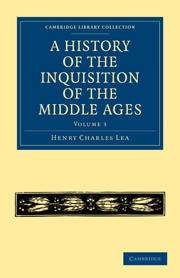Book contents
- Frontmatter
- Contents
- BOOK III SPECIAL FIELDS OF INQUISITORIAL ACTIVITY
- CHAPTER I THE SPIRITUAL FRANCISCANS
- CHAPTER II GUGLIELMA AND DOLCINO
- CHAPTER III THE FRATICELLI
- CHAPTER IV POLITICAL HERESY UTILIZED BY THE CHURCH
- CHAPTER V POLITICAL HERESY UTILIZED BY THE STATE
- CHAPTER VI SORCERY AND OCCULT ARTS
- CHAPTER VII WITCHCRAFT
- CHAPTER VIII INTELLECT AND FAITH
- CHAPTER IX CONCLUSION
- APPENDIX OF DOCUMENTS
- INDEX
CHAPTER IX - CONCLUSION
Published online by Cambridge University Press: 29 August 2010
- Frontmatter
- Contents
- BOOK III SPECIAL FIELDS OF INQUISITORIAL ACTIVITY
- CHAPTER I THE SPIRITUAL FRANCISCANS
- CHAPTER II GUGLIELMA AND DOLCINO
- CHAPTER III THE FRATICELLI
- CHAPTER IV POLITICAL HERESY UTILIZED BY THE CHURCH
- CHAPTER V POLITICAL HERESY UTILIZED BY THE STATE
- CHAPTER VI SORCERY AND OCCULT ARTS
- CHAPTER VII WITCHCRAFT
- CHAPTER VIII INTELLECT AND FAITH
- CHAPTER IX CONCLUSION
- APPENDIX OF DOCUMENTS
- INDEX
Summary
Having thus considered with some fulness what the Inquisition accomplished, directly and indirectly, it only remains for us to glance at what it did not do.
The relations of the Greek Church to the Holy See would almost justify the assumption that persecution of heresy, far from being a matter of conscience, was one of expediency, to be enforced or disregarded as the temporal interests of the papacy might dictate. The Greeks were not only schismatics, but heretics, for, as St. Raymond of Pennaforte proved, schism was heresy, as it violated the article of the creed “ unam, sanctam Catholicam ecclesiam.” We have repeatedly seen that to deny the supremacy of Rome and to disregard its commands was heresy. Boniface VIII., in the bull “Unam sanctam” proclaimed it to be an article of faith, necessary to salvation, that every human creature is subject to the Roman pontiff, and he especially includes the Greeks in this. Besides this, there was the Procession of the Holy Ghost from both the Father and the Son, in which Charlemagne forced Leo III. to modify the Nicene symbol, and which the Greeks persistently refused to receive, rendering them heretics on a doctrinal point assumed to be of the greatest importance. Yet the Church, when it seemed desirable, could always establish a modus vivendi, and exercise a prudent toleration towards the Greek Church. It was thus in southern Italy, which had been withdrawn from Rome and subjected to Constantinople in the eighth century by Leo the Isaurian during the iconoclastic controversy.
- Type
- Chapter
- Information
- A History of the Inquisition of the Middle Ages , pp. 616 - 650Publisher: Cambridge University PressPrint publication year: 2010First published in: 1888



